#Greatest Western Movie
Text
One of the Greatest Westerns Ever Made Is Now Streaming After Decades in the Wilderness
After Years of Inaccessibility, Maggie Greenwald's "The Ballad of Little Jo" Is Newly Available on Blu-Ray And Streaming — Here's Why That's a Cause For Celebration.
— By Jim Hemphill | March 25, 2024
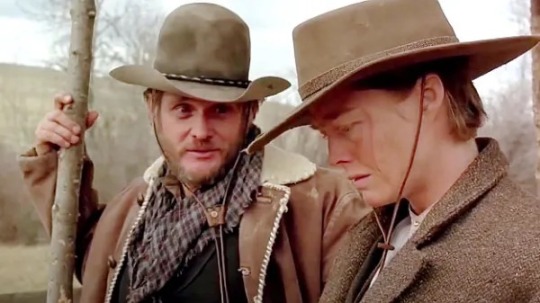
'The Ballad of Little Jo'Fine Line Features
Throughout most of the 1980s the Western was assumed to be a dead genre, certainly compared to the central role it once played in Hollywood’s construction of a national mythology. While there were occasional outliers like Lawrence Kasdan‘s “Silverado” and Clint Eastwood‘s “Pale Rider,” for the most part the responsibility the genre had to reflect and shape American values was taken up by either science fiction movies like “The Terminator” (which fulfilled the Western’s function as an exploration of the changes wrought on society by evolving technology) or urban cop films like “48HRS.” and Eastwood’s “Dirty Harry” sequels, which transposed the form’s archetypes and moral questions to a contemporary setting. Although the decade closed out with the successful “Young Guns,” that film was an anomaly whose success probably had more to do with its cast of attractive teen idols.
Then something funny happened in the early ’90s: Right as Hollywood seemed to have given up on the Western, it came roaring back with a vengeance and yielded the most varied, complex, and satisfying group of films since the glory days of John Ford and Delmer Daves. The box office and awards success of Kevin Costner’s “Dances With Wolves” in 1990, followed by Clint Eastwood’s triumphant return to the genre in 1992 with “Unforgiven,” suddenly made Westerns commercially viable again, and filmmakers who had been biding their time were able to will their dream projects into production. Lawrence Kasdan returned to the genre for the underrated and ambitious “Wyatt Earp,” Walter Hill made two of his best films with “Geronimo: An American Legend” and “Wild Bill,” and talented directors like Jim Jarmusch (“Dead Man”), Sam Raimi (“The Quick and the Dead”), and Melvin Van Peebles (“Posse”) made Westerns as different from each other — and as equally nourishing — as one might expect.
One of the best of the ’90s Westerns has also been one of the most difficult to see, but a special edition Blu-ray release in December and a streaming premiere this month have rescued it from years of inaccessibility. When writer-director Maggie Greenwald‘s “The Ballad of Little Jo” was released in 1993, its relationship to the other Westerns of the time was a bit of a coincidence — Greenwald had written the script before “Unforgiven” — but there’s no question that her film, like the best 1950s Westerns of Budd Boetticher, Howard Hawks, and Sam Fuller, benefited from the comparisons and contrasts enabled by being part of a recognizable tradition. Like those directors, Greenwald was brilliant at using the language of the Western as a shorthand, expressing her point of view not only by what she depicted and how but by where her treatment of the material paid tribute to the Westerns that had come before and where it deviated.
“The Ballad of Little Jo” is based on the true story of a society woman (played brilliantly by Suzy Amis in a performance that deserves to be spoken of in the same breath with James Stewart’s work in the Anthony Mann Westerns) who, shunned by her family after giving birth out of wedlock, rides West and reinvents herself as a man – Josephine Monaghan becomes “Little Jo” Monaghan, a successful sheep farmer who, like the characters in “Shane,” “Heaven’s Gate,” and dozens (hundreds?) of other earlier Westerns, defends her land against an evil corporation. Along the way, she sidesteps the advances of a young woman who sees her as a potential husband and carries on a romance with a Chinese laborer (the only person who knows her true gender) while becoming friends with a guide and mentor named Badger, played by Bo Hopkins in a role that can’t help but evoke associations with Sam Peckinpah’s “The Wild Bunch.”
The casting of Hopkins gives the viewer a clue to what Greenwald is up to, as she slyly references and honors not only Peckinpah but a whole history of American Westerns at the same time that she finds new directions for the genre. Much as Hopkins retains the strengths of his performances in Westerns like “The Wild Bunch,” “The Man Who Loved Cat Dancing,” and “The Culpepper Cattle Co.” while also revealing new layers of sensitivity, the film as a whole delivers the satisfactions of Westerns — “The Magnificent Seven,” “The Gunfighter,” “Shane” — that explore both the liberation of a life defined by rugged individualism and its limitations, but deepens and expands on the mythology. Part of this is inherent in the premise, and most of it is due to Greenwald’s probing intelligence and unerring visual sense.
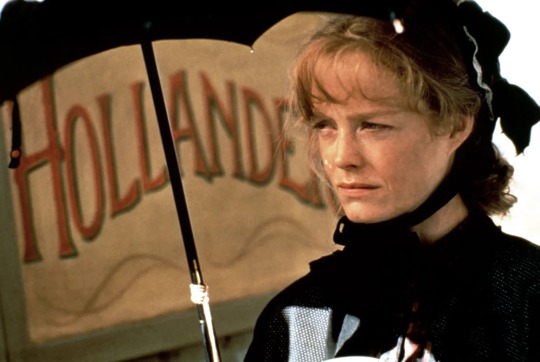
Suzy Amis, 1993, “The Ballad of Little Jo”©Fine Line Features/Courtesy Everett Collection
Most Westerns are about masculinity and how America defines what it means to “be a man,” and many of the best entries in the genre have been films that delve into the contradictions and complexities of the question. By telling the story of a woman who lives her life as a man in the old West, Greenwald explores traditional ideas of masculinity and femininity through a different lens than just about every other Western ever made, even ostensibly female-driven works like “Bad Girls” and “The Quick and the Dead” which, while both have considerable strengths, don’t really engage with the issue on a deep level. Like most Westerns, “The Ballad of Little Jo” takes place in a world where maleness is glorified as a source of power and progress, a fact that Greenwald sharply interrogates via the unique perspective Little Jo’s character provides. Greenwald asks the viewer to consider and reconsider ideas many Westerns (and American films in general) take for granted by posing two simple questions: What does Little Jo gain by becoming a man, and what does she lose?
Greenwald uses familiar conventions both the traditional way and with a spin that gives them a whole new dimension. One of the hoariest cliches in the Western, for example, is that of the “redemptive woman,” the schoolmarm or minister’s sister who exists in the movie to civilize the hero and help him assimilate into society. In “Little Jo,” the redemptive woman is a man, but by making him Chinese — and therefore “lesser” and isolated in the eyes of the white men in the film — Greenwald plays with ideas of power, gender, race, and economics (Jo’s lover works as her handyman) and explores how they intersect in fluid and fascinating ways. The ways in which the viewer is expected to understand these issues are irrevocably affected by seeing them through the eyes of a woman who is pretending to be a man; long before the end of the movie, the line between “male” virtues and “female” ones — a defining feature of many classical Westerns — has been satisfyingly and provocatively blurred.
The pleasures of the film are not merely or even primarily ideological; part of Greenwald’s greatness is how organically woven into the narrative these ideas are. There’s nothing anachronistic about the film, even though, like all great period movies, it’s an equally valuable reflection of the time in which it takes place, the time of its release, and the time in which you’re watching it. Greenwald has the confidence not to force or overstate her ideas but just sets the drama in motion and lets the audience draw their own conclusions.
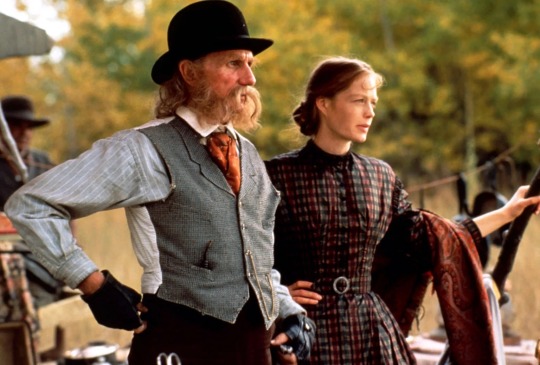
From left, Rene Auberjonois, Suzy Amis, 1993, “The Ballad of Little Jo” ©Fine Line Features/courtesy Everett/Everett Collection
She also provides a textured and expressive visual experience for the viewer that makes “The Ballad of Little Jo” one of the most purely gorgeous independent films of its era, and also a Western with a distinct look. Other directors had taken pleasure in the small details and nuances of day-to-day living in the old West — Robert Altman in “McCabe and Mrs. Miller,” Walter Hill in “The Long Riders,” Budd Boetticher in his detailed depictions of what it really meant to be a cowboy tending to a horse — but Greenwald takes it as far as anyone ever did, focusing not only on where Little Jo lives, but how and why, and how the simultaneously beautiful and forbidding landscape informs her choices. The movie is filled with specific pieces of costume and production design that allow the viewer to ponder the frontier existence in all its particulars, not just its sweeping vistas; it’s an intimate approach that perfectly complements Greenwald’s efforts for us to see everything through Jo’s perspective.
At the same time, “The Ballad of Little Jo” has a sweeping, epic quality that belies its limited budget, as well as a giddy embrace of some of the Western’s most basic pleasures. When Little Jo, in a sense, “conquers” her territory and succeeds on both her own terms and society’s, it’s immensely satisfying, and her sense of freedom is intoxicating. Yet just as Gregory Peck in “The Gunfighter” or the guns for hire in “The Magnificent Seven” are trapped in their roles, Jo is trapped by successfully becoming a man — she can’t escape her role any more than Steve McQueen could escape his. Greenwald ends the film with an allusion to another great Western, John Ford’s “The Man Who Shot Liberty Valance,” with her own take on the idea that “when the legend becomes fact, print the legend.” Like everything else in the film, Greenwald’s perspective on this topic is complex, ambivalent, and, to a degree, open-ended, inviting the audience to continue the discussion after the film is over.
In a sense, Greenwald is doing what the best Western directors have always done despite the “revisionist” label erroneously attached to the ’90s films in the genre. The best Western directors have always been revisionist — John Ford cleverly subverted the idea of the redemptive woman back in 1939, for example, when he made her a prostitute in the same movie where he made the villain the most extreme representative of capitalist philosophy. Like “Stagecoach” — or “Red River,” or “High Noon,” or “Buck and the Preacher,” or any of the other all-time great Westerns — “The Ballad of Little Jo” looks both back and forward.
Also like those films, it’s a singular personal statement. Given that Greenwald was the first woman to write and direct a wide-release American Western in the sound era, it’s hard not to draw parallels between her own journey and Little Jo’s, forging her way forward in a male-dominated field and choosing what to retain and what to discard — and like her heroine, showing everyone else how it’s done. One doesn’t need to know anything about Greenwald or the production history of her film or even its context as a ’90s Western to enjoy it, though; it stands on its own as a masterpiece that has always deserved to be better known and more easily accessed. Its renewed availability is a cause for celebration and an opportunity to rediscover an American classic.
“The Ballad of Little Jo” is currently streaming at Kino Film Collection and is available on Blu-ray from Kino Lorber.
#IndieWire#Film 🎞️ 🎥#Top of the Line#Greatest Western Movie#Maggie Greenwald's The Ballad of Little Jo
0 notes
Text
A week ago my roommate and I watched ‘Puss in Boots: The Last Wish’ in cinema theater and there were, like, 8 or 10 of us in the entire room. There was also a couple (a girl with her bf) sitting one row behind us, and they were laughing just as much as we did.
Long story short, someone on tiktok told the girl that there is a secret post-credits scene. So, when her bf supported her in waiting for that scene, our curiosity got the best of us and we also waited for it.
Everyone left the room, now there were just the four of us, patiently waiting, reading every name and snickering occasionally. We waited and waited, the lights were already on but we persisted.
And when the credits ended, we heard Puss asking ‘Are you still here?’ with screen fading to black and burst out laughing.
That was one of the best watching experiences I’ve ever had.
#puss in boots the last wish#and yes despite what you might think we russians still watch western movies in cinema theaters#we LEGALLY pirate them. dub them PROFESSIONALLY and then watch all those new films including Puss in Boots and Avatar#which we also watched XD greatest 3 hours of the year so far#(honestly I'm so glad dub actors didn't lose their job. it's nice.)#I guess it's the way it is. We put the 'r' into piracy.#(by legally I mean that we are not punished by the law. honestly. that was the only right decision done by the state last year)
14 notes
·
View notes
Text
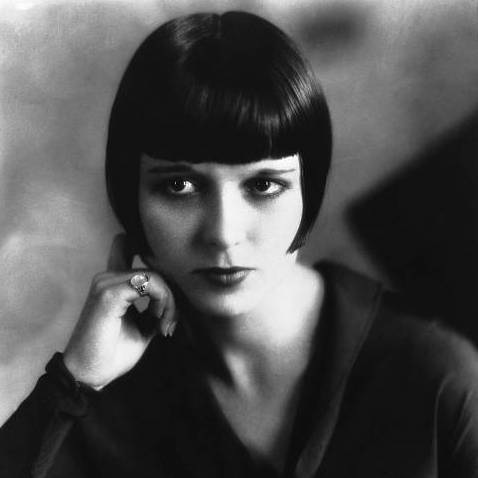
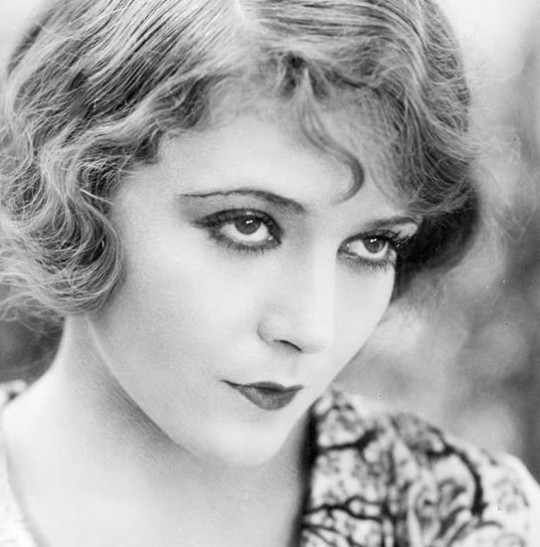
Propaganda
Louise Brooks (Pandora's Box, Diary of a Lost Girl)—Louise Brooks started off as a dancer and went to work in the Follies before going to Hollywood. Disappointed with her roles there, she went to Germany and proceeded to make Pandora's Box, the first film to show a lesbian on-screen (not her but one of her many doomed admirers in the film), and Diary of a Lost Girl, both of which are considered two of the greatest films of the 20th century. She helped popularize the bob and natural acting, acting far more subtly than her contemporaries who treated the camera as a stage audience. After the collapse of her film career and a remarkably rough patch as a high-end sex worker, she was rediscovered and did film criticism, notably "Lulu in Hollywood," which Rodger Ebert called "indispensable." Also, christ. Look at her.
Vilma Bánky (The Son of the Sheik, The Eagle)—She's famous now for being a silent star ruined by the transition to talkies, unlike her frequent co-star Ronald Colman. I think that's a shame, as she has a real vivaciousness and charm in The Winning of Barbara Worth. In this *checks notes* western about environmental engineering, she rides around the desert and gets wooed by both Colman and a young Gary Cooper (good for her dot gif.) Even in stills from films that are sadly lost, I think there is a distinctive warmth and individuality to her. Also she is extremely hot in her extremely pre-Code dress in The Magic Flame.
This is round 2 of the tournament. All other polls in this bracket can be found here. Please reblog with further support of your beloved hot sexy vintage woman.
[additional propaganda submitted under the cut.]
Louise Brooks:
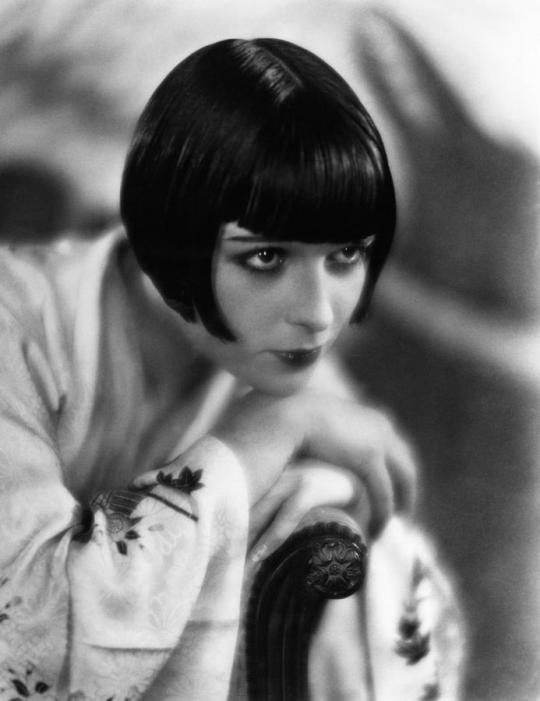
"Defined the style of the modern flapper. A gaze that could make a stone fall in love."
"Louise Brooks left a legend far greater than her real achievement as an actress, but even today few people have seen her films. In our own time, the fascination with Brooks seems to have begun in 1979 with a profile by Kenneth Tynan in the New Yorker, which revealed that the actress who made her last movie in 1938 was alive and living in Rochester, N.Y. Such was the power of Tynan's prose that people began to seek out her existing films, primarily this one, to discover what the fuss was about. What we see here is a healthy young woman -- she was 23 when the film was released -- with whom the camera, under G.W. Pabst's influence, is fascinated. There is a deep paradox in Brooks and her career: the American girl who found success in the troubled Europe between two wars; the vivid personality who briefly dazzled two continents but faded into obscurity; the liberated woman who had affairs with such prominent men as CBS founder William S. Paley as well as with women including (by her account) Greta Garbo but wound up a solitary recluse. And all of this seems perfectly in keeping with her most celebrated role in Pandora's Box. For despite her bright vitality, her flashing dark eyes and brilliant smile, Brooks's Lulu becomes the ultimate femme fatale, careering her way toward destruction, not only of her lovers but eventually of herself."
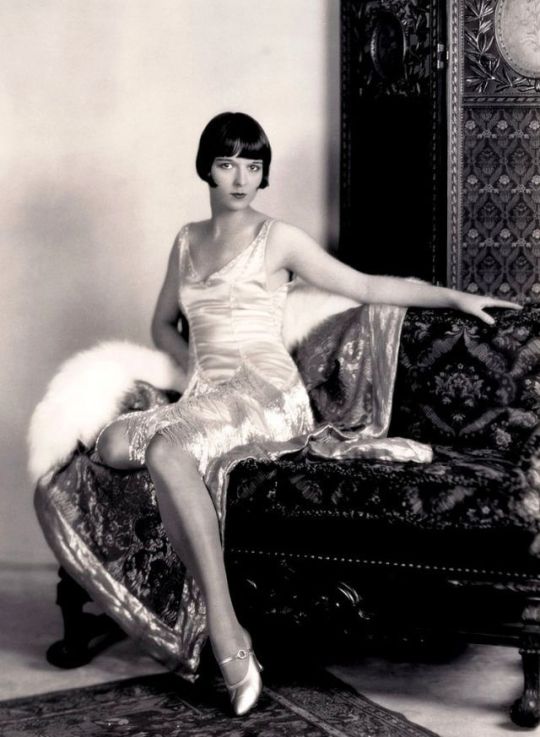
"She invented having bangs to indicate that you have borderline personality disorder"
"chances are if youve ever seen a "flapper girl" character or even just art of a generic flapper type made after the 20s it was based on her appearance - particularly the bob hairstyle! she had some pretty rough experiences through her life before during and after her tumultuous acting career which ended in 1938 but she made it to the 80s, wrote an autobiography and did a lot of interviews that she was never afraid of being honest in about her own life or peers of the age, and apparently was unabashed about some affairs she had with well known women (including greta garbo!!)"
"She read Proust and Schopenhauer on set between sets. She was one of the original flappers/new women of the 1920s. She had a one night stand with Garbo and was the inspiration for Sally Bowles in Cabaret. Truly a stone cold fox."
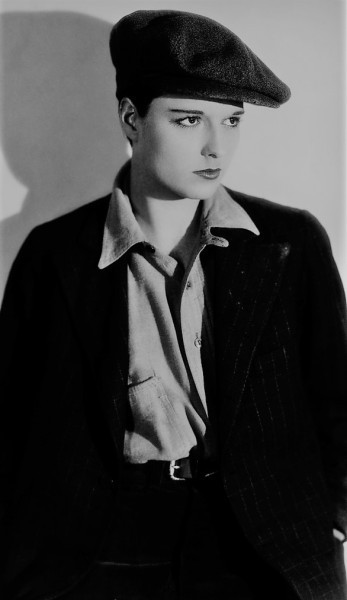
"on her wikipedia page it says her biographer said she "loved women as a homosexual man, rather than as a lesbian, would love them" and while i have no idea if this is true or not i thought that was very gender of her"
"despite being american she was big in german expressionist films and thus her aesthetic was unmatched!!"
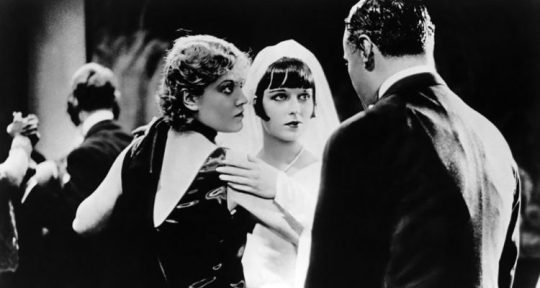
So far ahead of her time in regard to portraying complicated women. Timeless elegance. "I learned to act by watching Martha Graham dance, and I learned to dance by watching Charlie Chaplin act.” - Louise Brooks
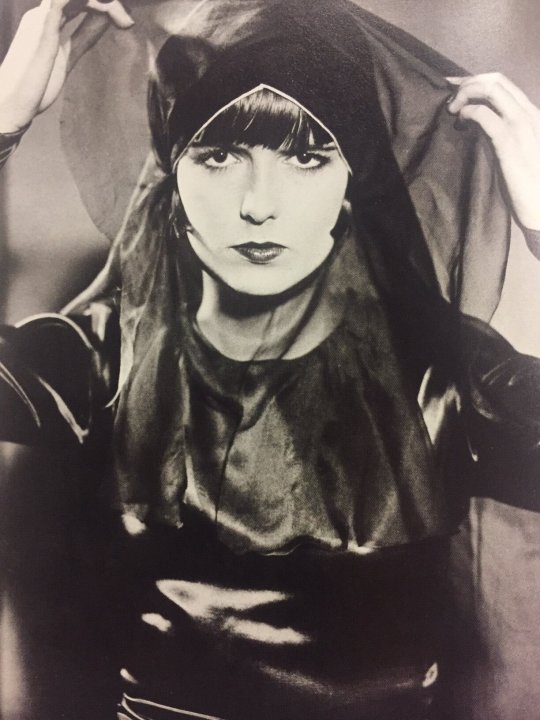
Vilma Bánky:
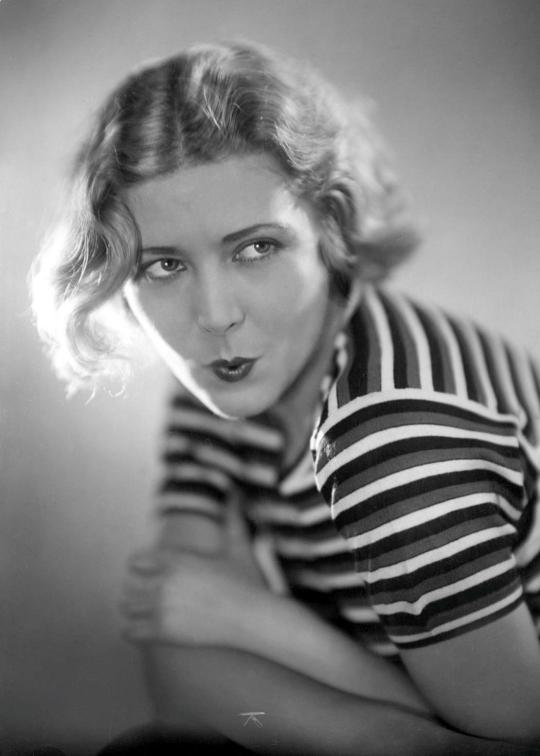
I love Vilma Bánky! She was called "the Hungarian Rhapsody" and apparently had a thick Hungarian accent which I think is cute. Several men fighting over the same women can be very cliche but when I saw her in The Winning of Barbara Worth (1926) I got it because my god she really is that drop dead gorgeous. She's also a wonderful actress though, expressive yet natural. I read once that seeing her in The Dark Angel (1925)—a film now seemingly lost—inspired Merle Oberon to become an actress :)
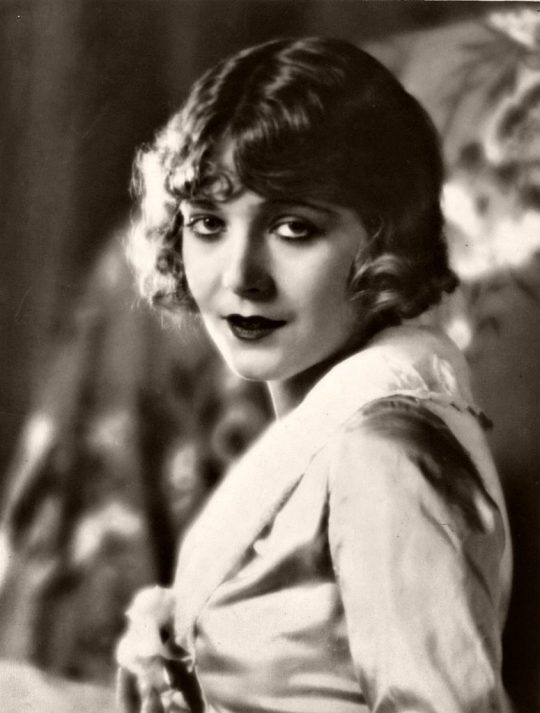
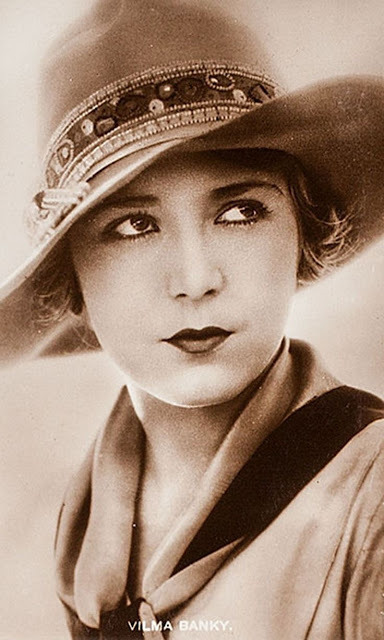

This is more of a factoid but she was apparently the women's golf champion at Wilshire Country Club through the 1940s. [link] I just think she's neat.
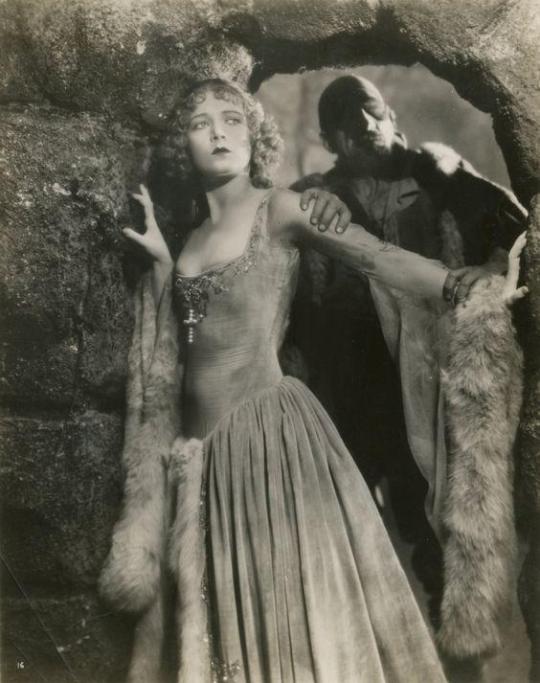
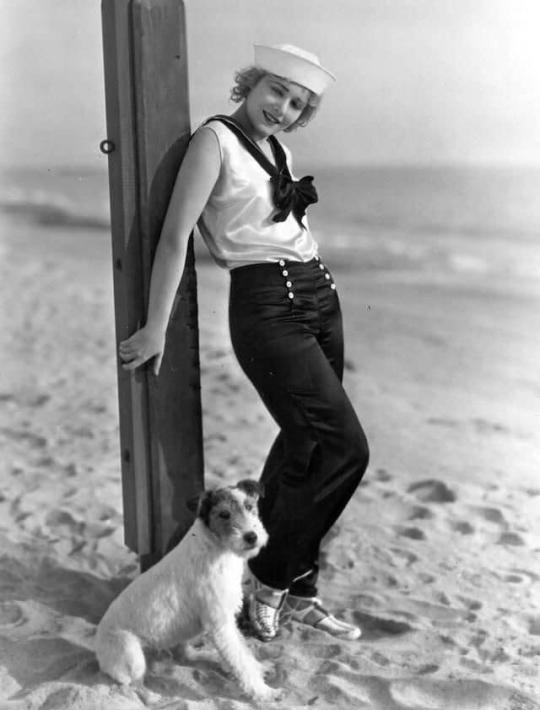
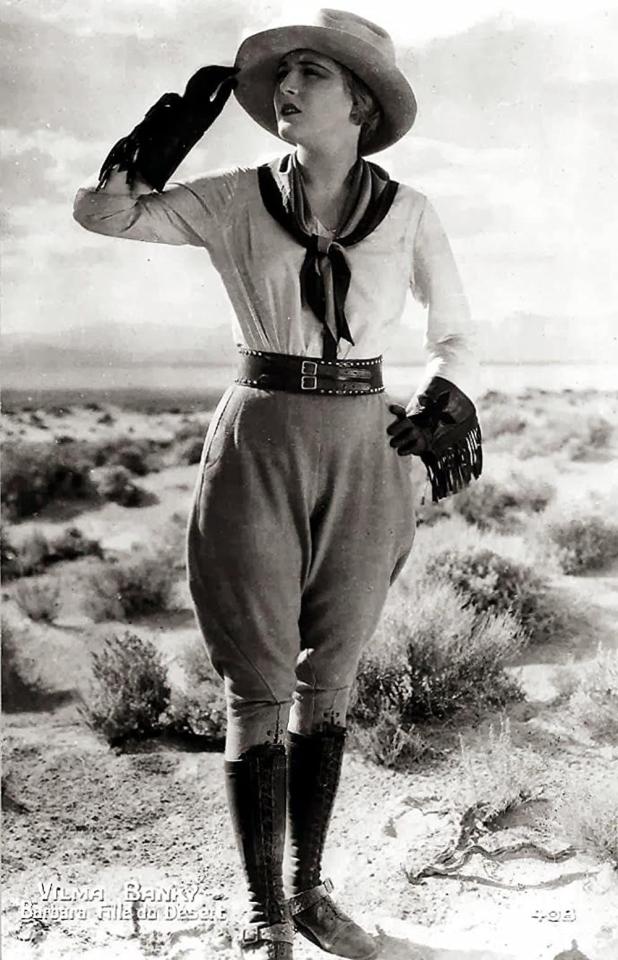
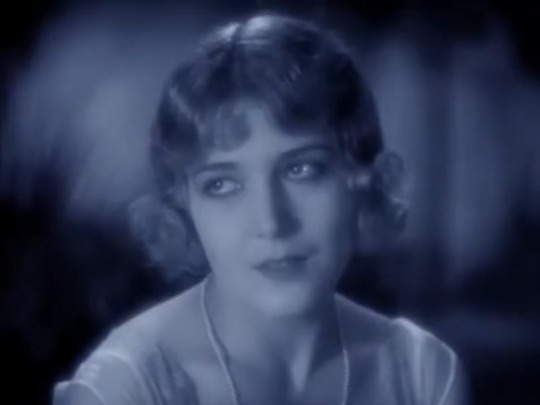
I love herrrrr she’s my everything. Watching her kiss Rudolph Valentino in Son of the Sheik made me so flustered I had to pause the movie to cool down. She’s the prettiest the most beautiful the most incredible woman I’ve ever seen. I could look at a picture of her for hours
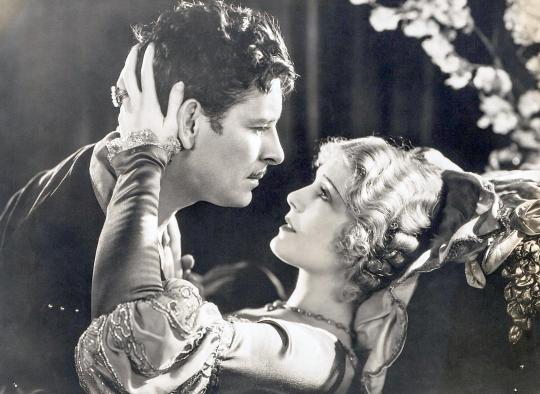
298 notes
·
View notes
Text
One thing I’ve grown to appreciate about the “Red Dead Redemption” series now that I’m older is that you can tell Rockstar approached this project as an anti-western. It lures you in with the promise of Wild West, yeehaw goodness, but when you actually play the games, you get hit with the brutal reality of this world.
Examples of what I mean:
1) The Mexican Revolution arc isn’t romanticized. At first, you think it’s a simple tale of the evil fascist government fighting against the heroic rebellion. But then you meet the rebel leader and he turns out to be just as bad as the government. It’s a true “both sides are in the wrong” situation and, unfortunately, the ones who truly suffer are the peasants (such as Luisa Fortuna).
2) Frontier life isn’t just shooting and action. It was also watching over animals, building farms and ranches, and trading with towns. The games really make you feel the monotony of doing chores and yard work, especially when John was in his Jim Milton phase.
3) Outlaw life isn’t romanticized either. Although you start off as a happy family, it eventually devolved into backstabbing, despair, and self-destruction. Even before then, your group aren’t the greatest of people, especially with the whole robbing people at gunpoint and shooting up towns.
4) Good guys don’t always get a happy ending. Also, every action has a consequence. John Marston had to learn that the hard way.
5) The racism. I feel like a lot of Western-themed media tries to skirt around this issue, or even avoid the topic (such as the 2016 remake of Magnificent Seven, which had a diverse group of fighters). Red Dead doesn’t pull back its punches. You have the Ivy League professor who treated Native Americans as subjects for his racist research. Abraham Reyes straight up calls Chinese people an inferior race. Then there’s the Blackwater short film playfully talking about the massacre of Native American tribes.
6) Along the same lines as point 5, the sexism. For example, there was the propaganda short film about opposing the women’s suffrage movement. And, of course, Sadie Adler not wanting to be relegated to cooking for the group since she can shoot.
7) This is more for RDR2. You actually have to pay attention to the maintenance of the horses and the guns. I’ve never seen this in a Wild West movie/TV show, and yet it’s integral to someone whose life revolves around horseback riding and shooting people!
8) Not skirting around the issue of disease, especially when healthcare wasn’t as advanced as it is nowadays. You can see that especially with Arthur and Abigail.
#red dead redemption 2#red dead redemption two#red dead fandom#red dead redemption#rdr2#rdr#john marston#arthur morgan#luisa fortuna#jim milton#abigail marston#sadie adler#rockstar games#wild west#gaming#rdr2 arthur#rdr john#red dead redemption community#gaming post#abigail roberts#van der linde gang
247 notes
·
View notes
Note
The rapresentation of abusers in helluva boss is something that particularly frustrates me, Stella in particular, it seems to be done just to victimaze certain characters not to show the complex dynamics of those relationships. It seems to me the writers aren't mature enough to handle these topics properly.
Abuse: The Heart of Vivienne Medrano
Christmas 1962, a man renowned the western world over for his revolutionary approach to animation sat in a withering melancholy as he watched what could only be called a cinematic masterpiece based on a novel classic. Walt Disney, now in the twilight years of his life, saw the walls closing in and his legacy coming to a close. This man, who pioneered the animated feature film, saw his greatest accomplishment as his greatest obstacle. The man responsible for the tales brought to life of Cinderella, Snow White, Pinocchio, and Dumbo felt trapped in his achievement. “I wish,” Walt lamented, “I could make a picture like that.”
To Kill a Mockingbird was a piece that challenged its audience. The discussion of a white man defending a black man in southern America, decades before the civil rights movement. The movement that, at the time the movie hit cinemas, was in its infancy. Released during the height of the historically revisionist counter movement taking place to combat the rising push of African Americans towards their human rights. The last film Walt Disney ever saw the production of before his death in 1966 was The Jungle Book, a movie that was the epitome of “Safe” and a message that upheld the status quo of segregation.
It wasn’t until 1972 that the media of animation became raucously adult with those political and challenging concepts Disney felt were unattainable. Fritz the Cat was an X-rated animated film composed of vignettes that were unapologetically perverse, violent, and aggressively political. Critical of politicians and the police with a sympathetic if exploitative lens towards the LGBT and racial minority communities Brooklyn-based director Ralph Bakshi grew up around. Bakshi proved that animation was not strictly a child-friendly media and that adult animation could be financially and critically successful.
(For more on Ralph Bakshi's career and animation history)
If one has ever had the opportunity to listen to a Brad Bird (director of Ratatouille and The Incredibles) interview, it is clear to see that the success of Bakshi was generally quite limited. That animation is considered a genre and not a medium of art has resulted in animated films being knee-capped in the box office. There is far more potential to animation, highlighted by Howard Ashton in his collaboration with Disney studios during the Renaissance. Responsible for resurrecting the feature-length animated movie through The Little Mermaid and credited for the monumental success of Best Picture Award winner Beauty and the Beast, Ashton once said that the potential animation was ideal for musical theatre. The limitless possibilities given the medium gave the possibility of introducing Broadway to the common folk who didn’t live in New York and otherwise couldn’t afford the theater. He was quoted saying that live action musical films were “an exercise in stupidity,” highlighting the freedom that comes with a blank page.
However, the success of animation, and media in general, comes down to the message the media wishes to send. The reason the Disney Renaissance films have enjoyed their position as cornerstones of pop culture and creativity was because it did introduce the artform of musical theater into homes and made them readily accessible to everyone with an even heightened sense of fantasy that revitalized Walt’s ethos of making films for the child in everyone.
With Bakshi, it was the loud and violently political message of a revolution taking place. This continues in adult animation with the Simpsons, a series critical of hyper-capitalist America and the fallout of Reagan’s economic disaster that the effects of which are still being felt today and a satire of toxic masculinity and abusive family dynamics.
So, ultimately, the value of a piece of media is a cross between its social artistic influence and the message the creators are intending to make. While Medrano’s influence on the field of indie animation is often mischaracterized as a “pioneer”, the fact is that indie animation and pilots have existed and been funded before Spindlehorse existed. It is simply that Medrano has had the spotlight handed to her for the myth surrounding the production and subsequent success of his indie projects. Artistically, her influence can be summarized as a double-edged sword. For some, she is the motivation for inspiring artists to connect with the community to one day, hopefully, create their own work. On the other hand, she is the cautionary tale of why investing in an indie project is a financial risk for an audience member and a risk to the community as a whole that poses a real danger of making the indie sphere financially cannibalistic, as her public persona is off-putting to “normies” and her show is simply not good.
Much like Disney, the man in 1962, and Disney the company circa 2023, the revolution of animating "because you can" loses its luster very quickly. Without something profound to say, an entire company, regardless of its social influence, can fade into irrelevance despite still being "successful". The story of Disney is a cautionary tale for Indie animation as a whole and Spindlehorse in specific.
And that is the other axis on this chart. Her narrative lacks a message worth telling, and that’s very much due to her not having anything worthwhile to say.
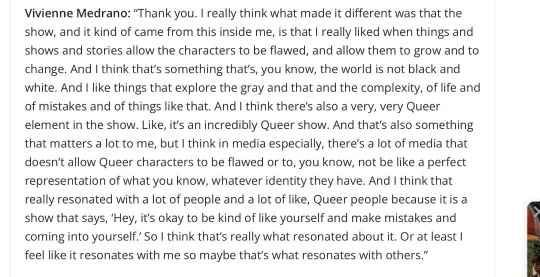
“I really liked when things and shows and stories allow the characters to be flawed, and allow them to grow and to change. And I think that’s something that’s, you know, the world is not black and white. And I like things that explore the gray and that and the complexity, of life and mistakes and of things like that.” - Vivienne Medrano
It is not for want of mockery that I carefully transcribe Medrano’s words in her interview. To read the words aloud tells the story just as clearly as I have set out to do here. This is someone who is highly inspired by better media, who has ideas and a belief that she has something to say. But that is where the belief ends. There is no conclusion to that thought any more than there is one in the unfocused and run-on sentences she rambles along throughout the interview. She talks of “Things” without clarity, because she herself is a fundamentally incurious individual who has never once spent the time critically analyzing herself, let alone the work of others to better grasp what about it resonated with her. She merely consumes art insatiably and without any substance. Like a diet of fruit, it has a superficial veneer of positive value. Fruit would be considered healthy as it is “natural”. However, it is the nutritional equivalent of candy, lacking vital components that are necessary to sustain basic life, it is pure sugar. Her work, similarly, lacks any value of depth that would qualify as meaning.
Which comes back to what the message is in her work.
When it comes to others in the field of indie animation, Medrano does not have many friends. In response to the Lackadaisy situation, creator Tracy explained why she returned Medrano’s donation. For one, the donation was not Medrano’s money, but money she crowd sourced from her employees. While the $5k for the producer spot of the fundraiser would have not been a dent in her personal wallet, Medrano is so uninterested in supporting fellow creators while presenting an impression of camaraderie that she instead took money from the people she is in charge of the paychecks for to get her name in the credits of another creator’s work. In regards to why Medrano was declined her support, it was due to numerous individuals who had such an awful experience working for Medrano that they did not want her involvement associated with the project to any extent. When the money was returned, she made the situation extremely public and encouraged harassment by liking tweets attacking Tracy and the Iron Circus team.
A well-known member of Medrano’s crew, Hunter B, was leaked speaking crassly of other animation projects that were still in the process of production, met with support from other members in the discord. One of these creators being Ashley Nicoles from Far-Fetched. A former friend and creative partner on the Hazbin Pilot whose podcast streams featuring Edward Bosco and Michael Kovach single-handedly maintained interest in the show until the winter of 2021, free of charge. Ashley once spoke of how Medrano would speak disparagingly of an employee to her, saying that this individual was “Too unstable to work with”. Which, regardless of whether or not that is Medrano’s honest opinion, counts as defamation by an employer. It is the exact reason why most previous employers will not give a negative, detailed review of a former employee, maintaining instead to verify facts of the employment. If Erin Frost was more experienced and less involved in social media exposed culture, they could have easily sued Medrano and Spindlehorse for damaging their reputation in their field of employment.
Which circles back to Medrano’s self-assigned message of her show:
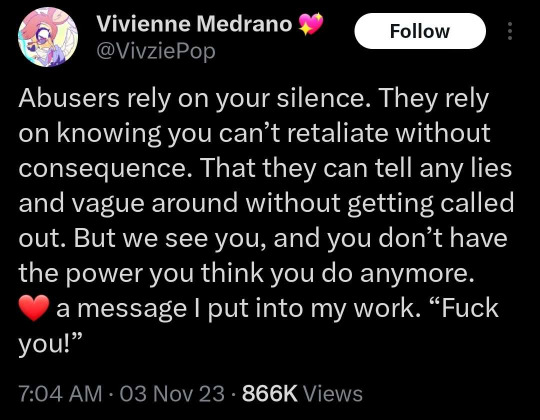
“Abusers rely on your silence. They rely on knowing you can’t retaliate without consequence. That they can tell any lies and vague around without getting called out. But we see you, and you don’t have the power you think you do anymore. A message I put into my work. “Fuck you!” - Vivienne Medrano
Medrano, who has vague and sub tweeted individuals like Lackadaisy Tracy, The Diregentlemen, Michael Kovach, and Ashley Nicoles. Medrano who has instigated and incited harassment campaigns knowing that no one can call her out without severe and relentless backlash from her cultish fanbase that she personally encourages through positive reinforcement of liking the tweets of fans. Medrano who relies on the silence of other creators in the field due to the fear of her ire collapsing their projects before they even have a chance to begin.
Vivienne Medrano with an extensive abusive history that continues to this day, has something to say about abuse.
What Medrano has to say about abuse comes from someone who has the position of superiority in all of her relationships, but feels like she’s the outcast and bullied loser. Her self insert that is repeatedly expressed in every character at one point or another is how easily they abuse those around them just because they can, but that the narrative justifies their “acting out” because they are sad. According to the National Coalition Against Domestic Violence, “An abuser externalizes the causes of their behavior. They blame their violence on circumstances.”
Indeed, the lists of abusive characteristics and traits, according to the National Coalition Against Domestic Violence, overwhelmingly encompasses the characteristics shown by characters like Loona, Blitz and Stolas that Medrano repeatedly has attempted to rationalize, justify and minimize. Which, “An abuser often denies the existence or minimizes the seriousness of the violence [including emotional and mental abuse] and its effect on the victim and other family members.”
It is not surprising, then, that the conversation of abuse in Helluva Boss is often infuriating. The narrative underplays the harm done by characters we are supposed to see as “good”. Not allowing for them to grow or change, but ignoring and minimizing the behavior, justifying it through circumstances and perpetuating the false belief that victims are not, themselves, abusers.
One of the first blog post rants I ever made about mental health and abuse was the affirmation that not all victims of abuse are survivors. I wholly stand by that. Victims of abuse perpetuate abuse. A victim and an abuser are one in the same, whereas a survivor is someone who has actually done the difficult work of being self-critical. And the one thing we all are very aware of is how much Vivienne Medrano rejects criticism.
#helluva boss critical#helluva boss criticism#helluva boss critique#vivienne medrano#vivziepop#vivziepop critical#spindlehorse critical#spindlehorse criticism#vivziepop criticism#helluva boss#perpetuating abuse#narcissistic abuse#abuse breeds abuse#essay writing
224 notes
·
View notes
Note
I hope you are doing good! And if requests are open might i request some hc of dabi, bakugo, and spike spiegel (its first boyfriend requester again sorry ;w;) reacting to reader who dresses up like them for halloween (or for spike reader dresses like cowboy andy hahaha)
Dressing Up Like Him HCs (Katsuki Bakugo, Dabi, Spike Spiegel)
𝗔/𝗡: 𝗵𝗲𝗿𝗲 𝘆𝗼𝘂 𝗴𝗼!
𝘀𝗽𝗶𝗸𝗲 𝗹𝗼𝘃𝗲𝗿𝘀 𝗳𝗮𝗻𝗰𝗹𝘂𝗯 𝘁𝗮𝗴𝗹𝗶𝘀𝘁: @dogsandrocketsocks @pittbull-enthusiast @asuperconfusedgirl @rendartgrimson
𝙒𝙖𝙣𝙩 𝙩𝙤 𝙧𝙚𝙖𝙙 𝙢𝙤𝙧𝙚? ⇒ 𝙈𝙖𝙨𝙩𝙚𝙧𝙡𝙞𝙨𝙩
𝙟𝙤𝙞𝙣 𝙢𝙮 𝙙𝙞𝙨𝙘𝙤𝙧𝙙 𝙨𝙚𝙧𝙫𝙚𝙧?
𝙗𝙪𝙮 𝙢𝙚 𝙖 𝙘𝙤𝙛𝙛𝙚𝙚?
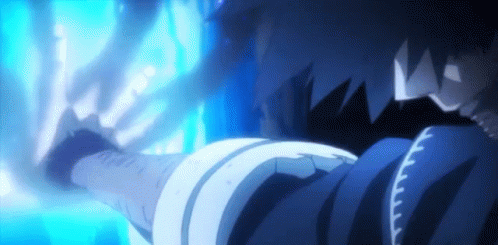
Dabi/Touya Todoroki
He’s gonna think you’re sooo cute lmaoo
He’ll tell you that too but only once or twice - he doesn't want it to get to your head
Chances are you’re probably wearing his clothes and string bean here long as fuck so it’s likely too big for you in certain ways
But he really likes the look of you in one of his shirts and his jackets (You look ridiculous in his pants because of just how ill-fitted they are on you but that’s beside the point)
The only thing that really throws him off is seeing the staples and skin graft scars on you
It’s a crude emulation of his actual skin grafts made from makeup and face paint, but it served as a weird and startling reminder of just how fragile you compared to him
The pain he suffered as a result of his own flames was hard enough but the idea of going through the same pain and process as him? No thanks
So in the end, he’s gonna think you look cute and will definitely let you borrow one of his jackets anytime you ask because he likes how you look in them
But don’t show him what you’d look like when you’re hurt okay?
Because who knows what he’d do if he saw you hurt like that for real

Katsuki Bakugo
Even since his debut, Halloween costumes of his hero costume have been pretty hard to come by
So you were pretty lucky to be able to snag a more feminine-looking costume a couple of years after his debut
It wasn’t the greatest material and there were definitely some details that they just didn’t get right (And you know he’d have something to say about the costume creators once he finds out later)
But seeing his face when you showed him the costume was more than enough for you to be satisfied
So naturally, he’s going to be super cocky and like grinning ear to ear like a complete dumbass
Like seeing his SO dress up exactly like him in a cuter version of his costume is really gonna make him happy because that ego is still a little unchecked
But he’s also gonna feel extremely proud
He knew of the existence of the halloween costumes and he knew he had fans
But something about seeing the person he loves most dressing up like him in a show of admiration and affection is probably gonna make him feel all soft and squishy and sweet on the inside
Not that he’d ever admit that though
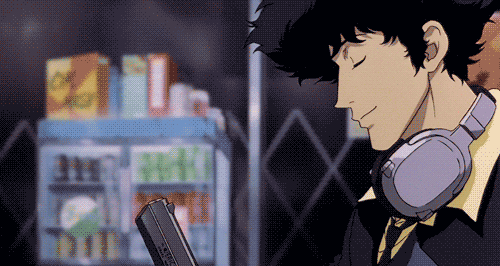
Spike Spiegel
At first, he’s gonna be mad because the outfit absolutely reminds him of Andy
But then you hit in with the
“I’m a cowboy Spike! I’m just like you!”
And he’s gonna fucking melt
Suddenly all negative feelings he has about cowboys are being washed away by the image of you looking like you walked fresh off the set of Big Shots
Because he’s him, he gonna mess around with your hat and make you pose and say certain things from old western movies with a drawl
He might even sneak a couple of photos here and there (or he’s gonna be completely shameless about it and take candid photos of you looking cute right in front of your face)
And eventually, he’ll probably hit you with his signature snark and tell you that he doesn’t dress anything like that
But he won’t be quick to ruin your fun though - he’s got a lot more compliments to shower you with
Especially since you dress up like all for him
#dabi x reader#dabi#touya todoroki#touya todoroki x reader#katsuki bakugo#katsuki#spike spiegel#spike spiegel x reader#katsuki bakugo x reader#boku no hero academia x reader#boku no hero academia fanfiction#boku no hero academia fanfic#boku no hero academia#boku no hero#boku no hero x reader#boku no hero fanfic#boku no hero fanfiction#my hero academia#my hero academia x reader#my hero academia fanfiction#my hero academia fanfic#my hero#my hero x reader#my hero fanfic#my hero fanfiction#bnha#bnha x reader#bnha fanfic#bnha fanfiction#mha
95 notes
·
View notes
Text

I got this ask on main but thought I'd pick it up here, my comics history/fashion ramble blog. I'd been wondering this exact same thing recently, and Google initially wasn't much help—Rocketeer replica jackets describe themselves only as "Rocketeer jackets" and the one Lobster Johnson cosplay thread just suggested ordering one of those.

The most curious part is the double seam and horizonal row of buttons that mark out the entire front as possibly being an unbuttonable "bib", like a plastron front. (Please don't ask how late in the game I worked out that "plastron" is the right word for that.)
The closest genuine Golden Age example of a plastron jacket I found was the military tunic style uniform of Blackhawk, created in 1941.

(Pics from the '52 movie serial (right) really show how awkward it is to combine open lapels + plastron. On a double breasted coat, that chest panel IS the bottom lapel, folded shut.)
Here's the thing: This outfit mirrors that of the Nazi ace pilot he fights in the origin issue, von Tepp (middle). And compare further to the far right: real life WWI flying ace Manfred von Richthofen, AKA the Red Baron, in imperial German Uhlan (lance cavalry) uniform.
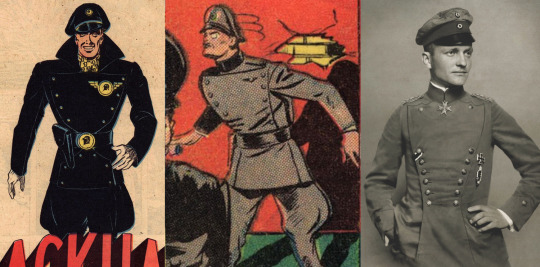
"The Germans had designed such great costumes, we decided to use them ourselves," co-creator Cuidera is quoted as saying in Steranko's History of Comics, which (more dubiously, in my opinion) compares the look to the Gestapo or SS. Breeches or jodhpurs weren't strictly a Nazi thing at the time, but they do add to the overall effect.
Compare two other military tunic themed costumes from 1940, on Captain Marvel and Bucky Barnes. These are asymmetrically buttoned, and switch to a more classic circus strongman look below the waist.

But somewhere around 1975, with the Invaders book, Bucky gets a buttoned bib! There's something infectious about it—the symmetry, maybe. (Even re: the characters we started with; Mignola didn't draw Lobster Johnson with buttons down the right side, but every artist after does. And Spider-Noir wore a sweater under his coat until Shattered Dimensions introduced the double-breasted vest.)
If it didn't reach his belt, Barnes' button-on front + shirt collar combo would resemble a bib-front western shirt, like the one that became the Rawhide Kid's signature look in '56. (Or Texas Twister's in '76.)
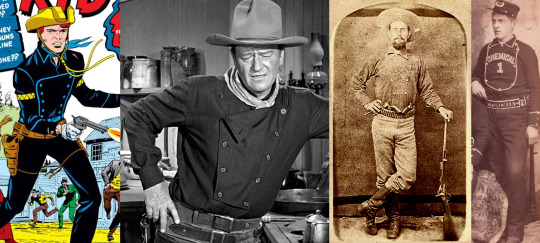
This shirt entered the old-West-obsessed public imagination in the 1940s/50s largely because John Wayne wore it in several cowboy movies. In reality it was rare among cowboys, more common with firefighters and civil war era militia.
Military tunics, Western shirts, alright, but does anything match the style and material and era, or are these jackets a total anachronism? I tried looking into 1930s leather flight jackets and was surprised when the closest-looking results were marked as Luftwaffe.
It took me a bit to work out why: USAF and RAF issued standard flight jackets with a center closure. The Luftwaffe instead let their pilots buy non-standardized ones. The 'weird' double-breasted black German flight jackets were in fact fairly normal (but repurposed) motorcycle racing jackets.
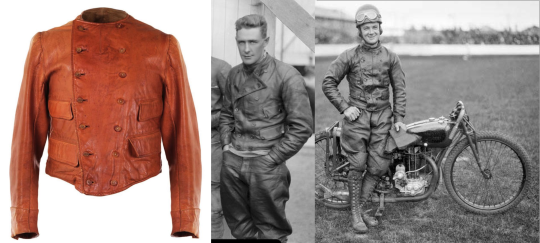
Far left is an English biker's jacket that dates back to the 1920s. Even without the bib, this may be as close as you'll get to an authentic Rocketeer. The jodhpurs were pretty common to complete the look. (What was an early motorcycle anyways, if not a weird metal horse?) The first biker jacket with the now iconic off-center diagonal zip was designed in America in 1928 and yet as far as I can tell, not a single actual pre-war pulp hero wore one.
The greatest weakness of this post is that I haven't been able to find any of these artists' notes on how, exactly, they arrived at similar versions of this iconic Pulp Front Panel Jacket. I'm sure I've missed some things. But as far as I can tell, this jacket is an odd bit of convergent stylistic evolution from the above influences that's picked up enough momentum to now be self-perpetuating.
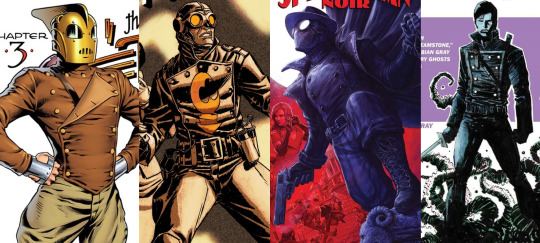
The problem with pulp heroes is that for the most part, they just wore clothes. The appeal of this jacket is actually very similar to what the 1940s thought the appeal of the bib-front shirt in westerns was: It's alien enough to feel "old". It looks like something invented before zippers or synthetic fabrics. It looks formal and militant but also renegade, rebellious. It also looks a little mad-sciencey*. It's a costume, but you can nearly fool yourself into thinking the past was weird enough that you could find something this cool on the rack.
If I wanted to end on some grand point, I could try to argue that there's a thematic throughline between fascist fashion, John Wayne movies, and throwback pulp. A manufactured aesthetic valorizing the violence of a fictional golden age... but I think the noir stylings of the post-Rocketeer comics in this lineup mean that, at least on some level, they know the "good guys" didn't dress like this.
*If I had another couple weeks of time to burn, I'd try to trace the visual history of the Howie coat in popular culture and investigate its possible connections to this. Alas, I do actually have a life.
#thank you for reading. also don't read golden age blackhawks the racism is awful even by era standards.#comics history#costume taxonomy#<- forgot I had that tag.#not to be like ''in MY favorite comics...'' again but may I point out that Hellboy and Robo and Tom Strong just wear... clothes#like. yknow. A pulp series that had confidence in itself rather than trying to cosplay as eras it thinks were cooler might do-#[I am yanked offstage before I can restart that rant]#the rocketeer
122 notes
·
View notes
Text
ROUND 4A, MATCH 1 OUT OF 2!

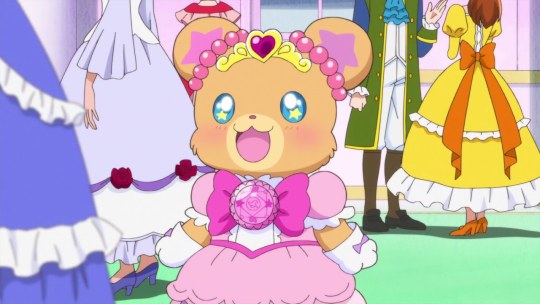
*Includes the original 1950 animated film, the 2002 sequel Cinderella II: Dreams Come True, and the 2007 sequel Cinderella III: A Twist in Time.
Propaganda Under the Cut:
Disney's Cinderella:
she is very iconic, she is super kind and has a beautiful dress
Submitting specifically because Cinderella III: A Twist in Time has lived rent-free in my head ever since I was a small child.
This Cinderella is most young (western) peoples introduction to this very story. Cinderella is so hopeful and by getting one small magical adventure, her whole life changes for the better. She is skilled and inspires such loyalty with her kindness that it’s hard to dislike her for any reason she gives. I’ve always been jealous of her ball hairdo too.
Walt Disney put all he had into this movie. And his favorite animation was the dress transformation scene. There’s a reason she is often front and center on the Princess group promotions.
she is the original. to me. probably the first exposure to cinderella for a solid chunk of people alive & on tumblr today. she is just a perfect encapsulation of everything that cinderella is, even if she's become warped in the public consciousness. also i'm pretty sure she's the reason why the glass slippers are so predominant in more recent retellings bc she is simply so iconic. 100/10 no notes 💜
She's maybe not the OG OG but she was one of the first animated Disney princesses and strangely enough it doesn't stop her from having an amazing personality. She's literally a slave but keeps being a nice person, forgiving and always doing her best. And the sequels absolutely didn't ruin her character. She's a sweet girl who tries to fit in but who's loyal to the person she is and who tries to change things always in a cute and sweet way to show people it's not that hard. She literally forgave Anastasia and tried to help her after all she did to her (the scene where the step-sisters destroy her dress still is terrifying to me)... she's awesome and deserves more recognition honestly...
(Mod's note: the following submitted specifically for Cinderella III: A Twist in Time, but I condensed the animated movies into one entry.) No she is not the same as the original Cinderella of 1950. This girl’s biggest chance was unfairly snatched away from her. When the Prince was brainwashed she was enough to get him to double take. She was so Right that their connection over powered magic. And she had to be rescued from a ship. And was almost crushed within a pumpkin! And finally had to expose another imposter, who turned out to be just another victim of Lady Trameine. This Cinderella fought harder for her love because she knew what True Love was like and she still was able to forgive those who asked for it.
(Mod's note: the following submitted specifically for Cinderella III: A Twist in Time, but I condensed the animated movies into one entry.) Listen yes it's the same Cinderella from 1950 but she has an arc in this one! It's Disney's greatest film!!
Listen I love them both but the animated Cinderella definitly shine in every single movie she has. And she has 3.
Vote for Cinderella because she deserves it and is still underrated in the Disney Princesses Franchise when she survived so much (ab*se... Lady Tremaine still terrifies me and she doesn't even have magical powers except when she steals the magic wand in Cinderella 3) Also one vote for Cinderella is one jump outside the window Henri is ready to do. Yes it's real.
Disney animated the original fairytale but definitely made it more magical and less creepy (like the birds making the step sisters blind? It gave me nightmares for ages). If I think: which one will I want to rediscover multiple times? Disney's Cinderella.
Plus Cinderella 3 is a masterpiece.
Mofurun as "Mofurella"
listen. they do an episode where they're all sucked into Cinderella and they make the trans teddy bear Cinderella. Incredible story writing, 10/10, no notes.
Mofurdella is even plot relevant, that episode is how they get the Rainbow Carriage for their group attack anyway MOFURDELLA FIRST CINDERELLA PRECURE EPISODE TO GET ONE MOFURILLION VOTES
#cinderpoll#round 4#round 4a#disney cinderella#disney cinderella animated#cinderella 1950#disney's cinderella#cinderella#mofurun#mofurella#mahou tsukai precure#mahou tsukai prettty cure#precure#pretty cure#fairytale#poll tournament#poll bracket#character polls#polls
122 notes
·
View notes
Text
(Instagram source)
So, Sim Kern has a tiktok on moral injury and leftist spaces. My problem isn't with the video itself (I found it quite insightful and now have another book rec to add to my ever growing tbr list) but with a particular comment on Sim Kern's instagram post of this tiktok:

To explain, the reason why I have an issue with this comment is because there is a tendency for left-leaning military veterans (esp those from the US) to prioritize/privilege/center their own hurt feelings over being "rejected" from leftist spaces. And what's even more frustrating is how so many pple, including Sim Kerns themselves, are jumping into the replies to comfort alexramos8485.
And this is frustrating to me because as a society, we are often expected to understand why military veterans, esp those from the imperial core, chose to serve in the military as evidenced in this reply:
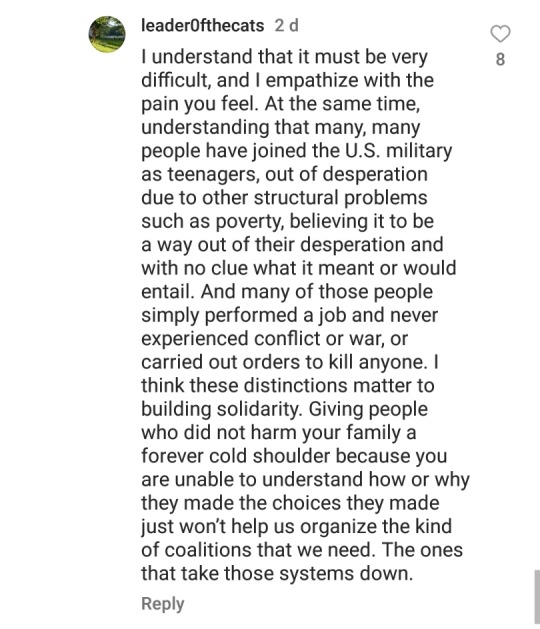
And this is because we have been conditioned by Western media to sympathize with military veterans from the imperial core (also becos the West has a lot of cultural softpower). So many tv shows and movies from the West are devoted to understanding the psyche of these soldiers, the troubles facing them when they return home from a tour, uncovering the backstories that led to them making the choice to serve in the military.
So here we are understanding why military veterans make the choices that they make, however these military veterans often do not make the same effort to understand why there are leftist spaces that are "hostile" towards them. This reply really sums my thoughts:
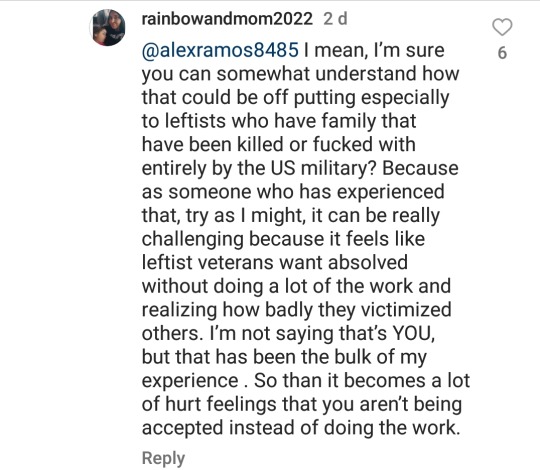
I'm not saying that we should reject military veterans from leftist spaces, they provide unique perspectives and experiences that are of use when building movements and coalitions. I just wish that for veterans from the imperial core wanting to enter leftist spaces, y'all have to do the work, y'all have to learn to de-center your feelings and actually listen to the pple impacted by the wars caused by your country's military forces which you are also complicit in, actually prioritize their feelings. One of the greatest strengths of leftism is that we leftists are a very diverse and ecclectic bunch so there are tons of leftist circles that exist, but remember that you are neither entitled to forgiveness by those affected by your complicity in your country's military nor to being in all leftist circles.
#sim kerns#anti military#imperialism#propaganda#leftism#military critical#military veteran critical#i dont know how to tag this#leftist
122 notes
·
View notes
Text
Hello world!
My name is Cam (he/him), and I’m brand new to the whole tumblr thing!
I figure the best way to join an online community is with an introduction, so here we are! Please don’t hesitate to reach out or interact! I’d love to make some new friends!!!
Okay, so who are you?
I’m glad you asked! My pen name, which I’m going to use for this blog, is Cam Scott
I’m 24, recently jumping back into writing after a whole slew of life stuff, and am looking to start grad school here in the next year or two!
Some of my interests include: comics, movies, folklore and folk music, philosophy, pro wrestling (the greatest form of theatre), and video games!
What do you write?
All kinds of stuff! Fantasy, sci-fi, mystery, westerns, even a comic or graphic novel from time to time. If only I could draw…
The only things you won’t catch me really writing are romances. Nothing against em, per se, but that’s not really my niche. A subplot? Sure! But not really my vibe for a complete work.
I also don’t really do fanfic, but again, no hate if you do! I think it’s cool to read people play around in those spaces; I just have to get all these voice- er, stories… out of my head.
Do you have any WIPs?
Too many! But I’ll try to list some of the main ones! (And keep it short)
The Silver Circle: The first in a fantasy series, it follows a group of adventurers making their way through a war-torn continent to help a cast-out prince reclaim his throne.
The Clockwork Lounge: A neon noir/cyberpunk-esque sci-fi story in which a man is hired to solve a murder in a casino run entirely by automatons.
Untitled Mystery (as in I came up with this yesterday lol): a man bounces back and forth between three bodies in three different time periods: the sailing age, the jazz age, and the far future in order to solve three murders that are somehow all connected.
If any of this sounds like anything you like, please don’t hesitate to follow! I’m also down for any tag games, asks, DMs, etc! I’d love to make new friends and really get involved with the community.
168 notes
·
View notes
Text
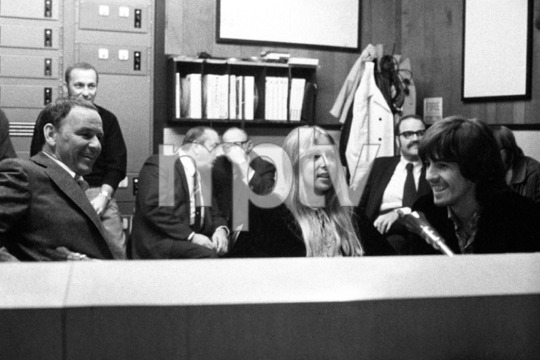
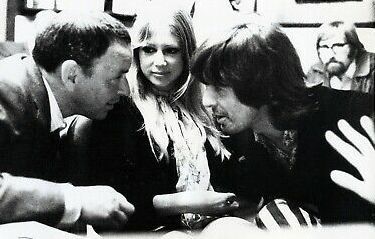
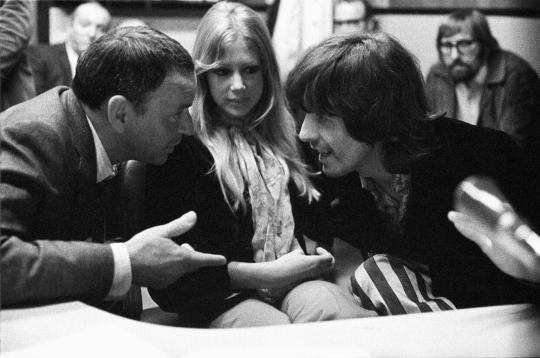
George, Pattie, and Mal Evans with Frank Sinatra in the control room at Reprise Records on November 12, 1968; photos © Ed Thrasher/MPTV Images.
“One diary entry I’ve left to the end because it’s a great one — a great memory for me at any rate. One Wednesday evening Pattie, George and I went to Hollywood’s Western Recording Studios at the invitation of Frank Sinatra. We watched him work through his session. Afterwards he took us all out for dinner on Sunset Strip and we had a fascinating time listening to his stories and gags. There’s an evening I won’t forget!” - Mal Evans, The Beatles Monthly, January 1969
“[W]e went along with his road manager, Mal Evans, and we went to the recording studio, and in the studio itself, it was — they had a full orchestra, and we went upstairs to the control room, where Frank was, and the engineer, and the producer, and Frank said hello to George and me, and then he said he was just going to go down into the studio to record. So this was really exciting, and we were looking through the big glass window, looking down at him there and the orchestra, and he sang ‘My Way.’ [gasps] This is absolutely wonderful, this is incredible. So he came upstairs, listened to it, we all listened to it, and he said, ‘That’s it, we’re going out for a drink now.’ And it’s as if he had done it just in one take. Who knows, you know, whether they’d done it a few times before we arrived, I don’t know, but in my mind, and George’s, he’d done it in just one take. So it was supreme, it was fabulous. And then off we went to a club, and there was this long table where Frank sat down. George was about to sit next to him, and one of his big guys said, ‘No, no, no, you can’t sit next to Frank.’ So George had to sit a couple of chairs away. I was at the other end with somebody from New York with a very strong accent, and they all had their own bottles of various whiskey in front of them. It was kind of like being in a movie.” - Pattie Boyd, BBC Radio 2, September 2019
Sinatra went on to record a cover of George’s song “Something" in 1970, calling the Harrisong “the greatest love song of the past fifty years.”
“‘They all say that "Something” was inspired by Patti [sic - Pattie] but it wasn’t really,’ George confides with an impish chortle. 'She was my wife at the time, but when I wrote that I had Ray Charles in my head. I always imagined Ray singing it, and eventually he did record it. There was a period of time when that became a Muzak tune; you’d hear it in elevators and I started feeling a bit embarrassed, but now I’m back into it and so happy to have written it.’
‘Sinatra was doing it for years,’ he notes slyly, 'so now I always think of Frank Sinatra when I’m doing it. In fact, I’ve got that in the live version: Stick around Jack, it may show.’" - Billboard, July 4, 1992 (x)
#George Harrison#Pattie Boyd#Frank Sinatra#Mal Evans#quote#quotes about George#quotes by George#1968#1960s#Harrison songwriting#The Beatles#George and Pattie#George and Mal Evans#fits queue like a glove
79 notes
·
View notes
Text
Put Me in a Movie - Chapter One
Miguel O’Hara x Fem!Reader
Summary - You’re a famous actress and he’s one of the greatest directors of all time. What happens when you get cast in his new movie?
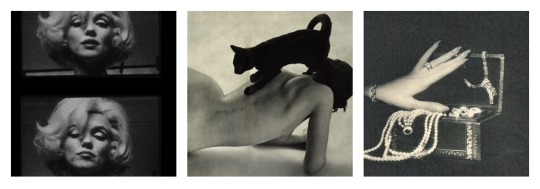
“In entertainment news, director Miguel O’Hara and actress Jessica Drew have officially divorced after ten years of marriage,” the blonde news reporter said. You’d heard through the grapevine that Miguel and Jessica were calling it quits a while ago. People in Hollywood like to gossip. Apparently, she was caught having an affair with the pool boy.
You get up from the couch and make your way outside. It was a nice and sunny day in Hollywood. Living in the Hollywood Hills meant one of two things: you were rich or you were famous. You? Well, you were both and you deserved every single ounce of it. You worked your ass off to get where you were today. From working in a record store in order to meet ends meet to working on movie sets.
You’ve done it all. Commercials, television, and movies. Movies were your favorite though. There was something so magical about seeing months of filming getting cut into two hours or less. You had major respect for everyone that worked on the set from craft services to the producers. You just loved the movie magic and getting to work in the industry was a dream.
You’ve been out of work for about two months, deciding to take a short break before auditioning again. You’d make appearances here and there to keep yourself relevant in the meantime. Your publicist kept your Instagram up and running and sometimes you would pop in and post a selfie to seem relatable to your fans.
Your last project was a flop. Apparently not a lot of people like Western films all that much. It wouldn’t tank your career though, too many people knew you were too good of an actress for that. Speaking of, your phone began to ring in the pocket of your pants. Your agent, Stacy Walsh, was calling you.
“Hi, Stacy. What can I do for you?” you asked. You didn’t know why she was calling you. You haven’t auditioned for anything new.
“I’ve got a part for you. It’s yours if you want it and it’s pretty good.” Stacy sounded like she was practically jumping with excitement as she spoke.
“I’m listening.”
“Miguel O’Hara wants you to be the lead in his next film. I know you said you wanted to take a break since the last film was a big flop, but I really think this could take you to the next level. Please tell me you’ll take it.”
Miguel O’Hara wanted you to be the lead in his next film! Miguel is one of the most influential filmmakers of all time! Every single film he’s ever made has grossed over one billion dollars worldwide. Not only that, but every actor that’s worked with him has come out not only as a better performer but also a better person. There is no way that you would let this opportunity pass.
“He wants me to be the lead? But I didn’t even audition or anything. How the hell does he even know who I am?”
“Thatiana,” you could hear Stacy sigh over the phone, “You are one of the greatest actresses I’ve ever worked with. You’ve been in plenty of great films and directors like watching movies for inspiration. Maybe he saw you in something and thought you were perfect for the role. Please tell me you’ll take this role.”
“Yes. Tell him I said yes,” you said.
Stacy celebrated over the phone and told you that you were awesome. The two of your bid farewell and hung up the phone. You took this role without asking enough questions. Were you going to get paid? What was the genre of the film? Who were your co-stars? There were so many unanswered questions that you had, but none of them were as important as this one. What was Miguel O’Hara actually like?
Chapter Two
#miguel o'hara#miguel o'hara x reader#across the spider-verse spoilers#miguel o'hara x female reader#fan fiction#miguel spiderverse#miguel x reader
137 notes
·
View notes
Note
Criticizing the police in a superhero story is kind of straightforward, examples exist, but what about the military in a kaiju story? Like, it's one thing to have the monster be immune to weapons but how do you avoid the usual cliches?
I would say most kaiju movies are pretty critical of the military - and so are a lot of Western giant monsters movies, to a lesser extent. The military is almost always impotent at best in a kaiju movie, rarely accomplishing anything more than stalling for time, and often end up making the situation worse. All the military's actions in the original Godzilla, for example, do nothing but make the monster more pissed off, until his final and most horrible rampage is directly provoked by the military's incredibly thorough and diverse attempt to kill him with every weapon they can think of. That is not a flattering portrayal of the military.
In fact, this trope is so common in the kaiju genre that it wasn't until decades after its inception that people tried to go against it - one of the directors of the 90's Godzilla movies talked about how G-Force in those movies was made because he always felt annoyed as a child that the military never accomplished much, and wanted to have them put up a better fight. Yet even then, MechaGodzilla, Moguera, and the various super xs never win - they come close, but Godzilla proves indomitable in the end.
Victories in kaiju movies overwhelmingly hinge on noncombatants and diplomacy - the happy ending comes from a scientist creating an ingenious invention, or fairies convincing their moth goddess to save our ass, or simply allowing Godzilla to swim off into the sunset when he's done defending his territory from the invasive monster of the week.
Some modern American kaiju pastiches find interesting ways to make the military useful while trying to stick to the themes baked into the genre's bones - Godzilla 2014 has a protagonist who, while in the military, specifically works as a bomb disposal expert, i.e. someone who keeps violence from escalating rather than perpetuate. Said character is drawn as a direct reflection of Godzilla himself in the same movie - heroes defined by their desire to stop a violent situation from exploding rather to destroy for the sake of destroying.
Pacific Rim explicitly focuses on a military organization of pilots in giant robots trying to fend off alien invaders using kaiju as weapons - but in the movie's greatest break from reality, said force is woefully underfunded, stripped to just a handful of robots and pilots. While the Jaegers of Pacific Rim have the trappings of some real world miltiary stuff, I think ultimately they don't resemble the military that much in execution, being more akin to, like, a remnant of an army turned into a guerilla resistance force, and really they make more sense when you take them as a metaphor for the few people actively fighting against climate change in our world (which the movie makes pretty clear is basically the theme, more or less - the aliens are specifically seeking our world out because we've fucked up the environment enough to make it favorable to them). And, ultimately, the Jaegers only manage to get their job done thanks to the help of two very brave scientists.
But, in all honestly, I feel no need to do away with the "cliche" of the impotent military in kaiju flicks. Fuck the military. Show them as incompetent, war-mongering, overfunded and undereffective assholes. Fuck 'em. They get their cocks sucked by every other genre with a budget, they can take a few beatings in the kaiju flicks.
63 notes
·
View notes
Text
Ya think Clover looks up to cowboys as well? Probably not like to the extent of Starlo, but it’s clear that they’re not from the time when they were prevalent.
Considering that they don’t have the greatest home life, they maybe used western media as an escapism because the heroes of those movies are always looked up to by the town, and freely roaming the Wild West. (Stars probably appeared in their eyes when first entering the Wild East.)
And they are a lot more real than super heroes and wizards.
#while the protrayl of cowboys in movies are not 100% accurate to real life. Clover doesn’t know better#I should really drawn them at some point#rambles#uty clover#undertale yellow#undertale#utdr#vio.txt
32 notes
·
View notes
Text
Birds of a Feather- A Bradshaw Sibling Story
Chapter 1- Welcome to the World Baby Girl
Carole, still reeling from the loss of Goose, isn't sure how to feel when she learns she is pregnant. Thankfully she has the support of two Navy pilots to help her welcome her newest addition to the world and a certain blue eyed Lieutenant ends up being a surprising rock at her side.
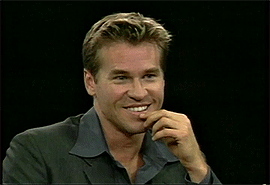

Notes: Once I get through the background information, this story will be told in a more story-like format (with conversations and better descriptions etc). Right now I just want to get you all to the point that movie begins with all the history (and drama) I've given these characters.
Welcome to the World Baby Girl
When Carole Bradshaw finally starts recognizing the signs of pregnancy, seven weeks after burying her husband, her first instinct is to just cry. She had been doing that a lot lately, barely able to make it to her son Bradley’s bedtime before she sobs deep and hard into Goose’s pillow. Now though, as she recognizes the churn of her upset stomach as not the flu but morning sickness, she has to fight the urge to not collapse to the kitchen floor right then and there. Bradley, oblivious to his mother’s struggles in the way only a small child can be, plays with his cereal, spooning the cheerios happily as he manages to forget once more what Carole herself can never; that Goose is never coming home again.
Carole has never thought of herself as a particularly strong woman but she concedes that perhaps she is tougher than she thinks. She keeps herself together, encourages her four year old son to eat instead of play with his food and manages to wait until a reasonable hour in the late morning to phone her sister and ask her to babysit for the day. Her sister Judy agrees immediately; all of her family in the walking on eggshells stage of caution around her that Carole is pretty confident she could ask them to help her commit a robbery and they would be there in masks just to never have to tell her no. She appreciates it, when she doesn’t find it maddening, but on a day like today she is particularly grateful.
After Bradley is dropped at his Aunt’s, Carole drives two towns over to pick up pregnancy tests. It’s not that she is ashamed, not at all, but their town in Western Pennsylvania is small and gossip travels fast. Carole might be stronger than she thinks but she knows she’s not strong enough for the rumors to start without knowing if she’s carrying or not. Besides, the possibility of carrying her late husband’s child could be a precious gift, something she won’t risk tarnishing by letting it out before she is certain.
She scours the shelves of the small pharmacy she stops at, pretends that she is there for the gummy bears she grabs for Bradley and the lotion she picks up for herself. Carole heads to the women’s aisle and finds the ClearBlue boxes, remembering when she heard about at-home pregnancy tests a few years ago and how she found the concept completely mind-blowing. Now she is thankful as she grabs three boxes and heads to checkout, gratified that the woman at the cash register clocks her wedding ring and smiles a good luck as she grabs her bags to leave.
She heads home and follows the directions to the letter, though the young blonde has never been known as a rule follower before. Energetic, fun, life of the party, if Carole took a moment to really think about it, she would realize that she not only lost her husband but a part of herself as well that day; the part that smiled and danced, that hooted in excitement regardless of her audience, the part that lived for joy as easy as one lives for breath; but that was all gone now, even more so when she noticed all three tests coming up with the same result.
She was pregnant.
Tears come, as she knew they would, and Carole isn’t sure if she should be horrified that she still isn’t sure if this is what she wants. One more piece of Nicholas Bradshaw should be the greatest gift in the world, but a baby growing up without a father also seems the cruelest. Is it fair for Carole to bring a baby into this life when she herself is already so close to floundering? Is it blasphemy to even think of not having this baby? Carole knows it’s up to her, that no one else in this world can make this decision for her, that no one can judge her for what she decides do as well. She clutches Goose’s wedding that she has moved to wear on a chain around her neck and places her other hand on her abdomen. It’s too early for kicks or to feel any movement, but Carole does experience a sort of calm tranquility as she stands in her bathroom in the silence, her hands connecting her past with her future. Goose always wanted a big family, had cried like a baby when they first learned they were expecting Bradley. He would want this child more than life itself, would have given his life willingly if he knew it would give her this blessing. Carole pictures a little baby, with Goose’s nose and smile, her husband’s amber eyes staring back at her as she rocks the newborn in her arms. It will never bring Nick back, will never lessen the pain of his loss, but maybe, just maybe, it can create some love with it too.
Everything moves quickly from there.
Carole tells her family first and more tears come. It’s different this time though, she can already tell, the grief still pressing but also lifting just that tiniest bit, her mother’s tight squeezes as they cry together healing in a way she wasn’t expecting. For a moment she feels traitorous, as though she is ignoring Nick’s death with the preoccupation of the growing baby in her body, but soon she realizes that perhaps this was Nick’s gift for her all along, something to help her through.
She tells Goose’s parents next and if she had any thoughts of not going through with the pregnancy, they die the minute Henry and Margaret fall upon their living room floor and hold each other, thanking her for telling them and begging Carole to let them help in any way they can. They spend the rest of her trip to Tennessee alternating between taking Bradley around their farm and making sure Carole doesn’t lift a finger, each sparing glances to her still flat belly when they think she’s not looking. It’s overwhelming at times but also weirdly comforting, Carole feeling closer to her in-laws than she ever felt before. She mentions her comfort of this type of living when the topic of Carole putting up her home in Pennsylvania for sale. The blonde isn’t surprised when the elder Bradshaws immediately offer her space on their land to live with Bradley and the new baby. It’s a kind offer, more generous than she could really say, but she declines.
She knows where she needs to make her new home.
Her family didn’t understand when she told them she plans to buy a house right outside of North Island and from the way Margaret’s face pales and Henry grows silent, it seems the Bradshaws don’t understand either. Carole expects this, she appreciates why this would seem so strange to everyone else, but the young mother can’t imagine bringing another child into this world and being so far away from her husband’s final resting place. Nick is in North Island, in a military cemetery not far from the waters he died in, from the air he flown in; Carole owes it to her children and her husband to not keep them any further apart than fate has already made them.
The move cross-country might break her, but it will be her cross to bear.
The bungalow she buys is small but homey, and perfect for the neighborhood they choose. It has the cutest garden, that Carole immediately starts to plant the most vibrant flowers she can, and a porch swing that she has a kind neighbor check its integrity of before it becomes her and Bradley’s favorite spot to watch the sunsets. As for the house itself, it has three bedrooms, one for each of the now remaining (and soon to be arriving) Bradshaws and is close enough to the beach that she and Bradley can walk every day across the sand. Her son loves it. His hair, which slowly starts to darken despite being consistently in the California sun, is always in a perpetual state of curly unrest from the sea breeze, his body tracking sand everywhere in their home. Carole only laughs, even when her stomach starts to swell and it gets harder to clean up all the time. Bradley has taken to the idea of a sibling remarkably well, all things considering, though he is sure in the way only a four year old can be when he pats at her stomach and asks how his little brother is. Carole decided not to find out the sex, not ready to see if she is getting a Nick or a Nicole, the names already decided as they feel only right.
During this time she wonders if she should tell Maverick. He writes her when he can, sending the letters to the family’s old address that her sister is kind enough to forward, but Carole makes sure to not tell him anything about what she is really going through, bringing a baby into this world alone. It’s not that she doesn’t trust Pete or that she doesn’t want him to know per say, she just doesn’t want to make him think he needs to take care of her. He’s young, so young, and though he feels responsible for what happened to Goose that day, Carole wasn’t lying when she told the pilot she didn’t blame him. She doesn’t, and she never will. She knew just as much as Goose did about the risks he took each day. Pointing fingers or tossing blame didn’t bring the man back; it just pushed those who remained away.
The problem with Pete Mitchell was that the man was a lot like a puppy who enjoyed punishing himself. She saw it when they first met and the kid was weighed down with the guilt of his father’s service records, and she saw it after Goose was declared deceased and Pete expected her to smack him instead of embrace him in a hug. Carole knew that if she told Maverick about the baby Pete would think it was his duty to put everything on hold and be at her side and she couldn’t ask him to do that. It wasn’t his responsibility, best friend or not. He deserved to live his life; he deserved to move on.
But sometimes life doesn’t let you make those decisions.
In her seventh month, Carole gets a knock on the door and opens to reveal one Iceman Kazansky in his service khaki’s. The man’s blue eyes immediately stalked down to her growing belly and his lips purse before he snaps himself out of his thoughts and meet her gaze. It seems he had come to apologize for his own actions that day, explaining that if he had moved out of the way quicker than Mav wouldn’t have been caught in his jetwash, ultimately leading to the spiral that forced both Pete and Nick to eject. Carole listens silently, allowing the man to get all his feelings out before she tells him the same thing she told Mav: she doesn’t blame him.
For all the coldness of his reputation, Ice gives a sharp nod before allowing just the barest of tears to fall, though he wipes the evidence away quickly. He stands then, expecting to be asked to leave now that he has said his peace but Carole just offers him to stay for dinner. The man accepts before she even finishes her statement. She expects some awkwardness but there is none to be found, Tom is nothing but a gentleman and the perfect guest, even taking the time to play with Bradley as the child shows the pilot all his favorite toy planes.
When dinner is over and Tom finishes washing and drying the dishes he insists on doing, he finally brings up Pete’s status. Carole had listened to the tall blonde pilot talk vaguely about the Leyton mission during their meal, classified though, so beyond saying it got a little close and Maverick had to come to his aid, Kazansky had stayed mum on the true details. Much different than Maverick, who discussed the mission at length in one of his prior letters, not adhering to secrets any better now than he ever did before, much to Carole’s amusement.
Tom takes the seat across from her at the now cleared table, fingers steeple in front of his lips. He is a patient man, she gages that just from this one night of interactions and Carole can tell that he chooses his words carefully. Finally, when he is ready, Tom tells her the truth, that despite getting over his trepidations in the sky, Pete was struggling again, finding himself in the rambunctious death-be-damned stage of mortality that leads to reckless actions and tragic conclusions. Tom was worried before but he is anxious now, admitting to Carole that he came to the house not only to apologize for his actions on the day that Goose died but also to ask the blonde for her help in reign Maverick in, afraid that no one else could be up for the task. Carole knows she has the right to say no, that no one could blame her if she was to say she has too much on her plate as it is to try and save a renegade 25 year old pilot with enough issues that he could fill the sky he flies in, but she also knows she loves Pete, he’s the little brother she always wanted, and she won’t let the universe take him away too. She tells Tom to give her his number.
A week and one overly emotional reunion later, Pete ‘Maverick’ Mitchell becomes a permanent fixture back in their lives. He’s stationed at Top Gun again so it’s easy for him to be at their house for dinner every night, pulling a reluctant Iceman with him; an ecstatic Bradley more than happy to welcome them both with open arms. Carole feels as though maybe she was wrong not to tell the younger man about the pregnancy right away as he takes one look at the not yet built nursery furniture and he and Ice roll up their sleeves; building everything themselves in record time and then hanging model planes in Bradley’s room as a nice surprise for the future big brother. They become a family, the five and a half of them; dysfunctional in their abnormally but aren’t those always the best?
As her third trimester progresses either Pete or Tom is there for every one of her doctor’s appointments, sometimes even both go, earning her skeptical looks from some of the other patients and nurses that don’t know her whole story. She doesn’t care; Carole has never been one to desire people’s approvals, and she welcomes the Naval Aviators’ dual support as the realness of becoming a single mother to two children gets closer and closer.
But then again life deals her a harsh hand.
Pete is fired from his position with Ice teaching at Top Gun. If it didn’t hurt so much, Carole wouldn’t have been surprised; Pete is not someone that should be teaching anyone about rules or regulations, but it still wounds the pregnant blonde when he is re-deployed to a carrier in the Pacific. She wants to be angry, at him, at the Navy, at the world, but it won’t help the situation and she knows that. She’s two weeks from her due date; she has to accept that Pete won’t be at her side.
Tom will be though. Tom who has taken to her family as easy as Pete did all those years ago. Tom, who buys her baby clothes and toys, never forgetting to get Bradley something too so the kid never feels left out. Tom who makes her dinner when she can’t seem to stand for too long, cleans her house when she feels the anxiety of nesting deep in her chest, and entertains her crying tantrums about how she misses Nick and wishes he were there.
Tom is a god sent.
Carole wondered at first why he was so willing. Guilt is powerful, but the man is giving up his whole life for her little family, without getting anything in return. Or so she thought. She comes to learn that Tom has no family of his own, his parents both passed, his mother just less than a year ago, and that besides Slider, who has also become a permanent fixture in her life now when he’s in town, Ice has no one. Wounded hearts tend to find each other and Carole is happy to open her home to one more lost soul, if only to heal them all.
Her water breaks on the beach of all places, as she stops to pick up a seashell and Bradley laughs that mommy peed her pants. It’s only the two of them of course; Ice teaching for the day, so Carole walks herself and Bradley back to their little house and manages to call 911 and the air base Ice is stationed. A neighbor she has gotten close to takes Bradley to play with their own children and Carole is loaded into the ambulance alone. She tries to hold in the emotions when the nice paramedic holds her hand through the contractions, tries to pretend it’s Nick, or even Pete or Tom and not this virtual stranger, but the sobs roll easily, the heighten hormones leaving her gasping in their intensity.
She is brought to a room and encouraged to relax, treated like a first time mom though she’s been through this before. Carole figures in a way this is like a first; Nick was at her side all through Bradley’s labor and delivery, cracking dumb jokes to make her laugh and promising her that she could kill him later for the pain his actions put her through. She remembered threatening a lot of bodily harm, even a threat to cut off a body part but the minute Bradley was placed in her arms she only felt love. Pure, unadulterated love in its strongest form. Would it be the same this time? Would she be moved to bliss like she was the first time she gave birth? Or would this poor little baby be placed in a crying mother’s arms, a mother filled with grief and pain? Was it fair of her to do this?
Carole doesn’t have time to dwell on those thoughts because Tom arrives then, flustered and out of breath like the normally composed man never seems to be. He zeroes in on Carole, seems to recognize her barest attempt at keeping herself together, and just goes right to her side. His hand grabs hers and squeezes, as though he hopes to transfer all the strength he holds in his muscles to her, as though he is willing to transfer his very life himself if only to help her through this. Carole manages a smile, albeit a small one since a contraction decides this is the best moment to strike, as she looks to the blond pilot next to her and thanks him for being here at her side. Tom only says there is nowhere else he’s rather be.
Tom is the rock at her side through it all. He calls her neighbors to check on Bradley and informs not only her own parents but Nick’s as well about how the labor is going. They all try to catch the next available flights but they won’t make it in time, something that Ice has the good graces to not correct her on when Carole foolishly hopes her mother will be in California in time for the baby’s arrival. Tom even manages to get a message out to Mav, using some favors he stockpiled to have the call made through all the way in the middle of the ocean. There’s nothing Pete can do from the ship but it still brings a little relief to Carole’s jumble of emotions that at least the dark haired pilot knows what’s going on.
As the hours progress, Carole expects Tom to leave but he never does. He takes a few breaks to relieve himself or take a second to sit but otherwise he’s with her through it all, though he makes sure that Carole knows if she wants that to change, if his presence isn’t welcome, he will leave at her slightest hint. It warms the blonde woman’s heart in a way she can’t imagine feeling, this man devoting so much to her and she rewards him by just holding his hand tighter. Carole asks Tom to tell her stories, anything to get her mind off the pain and the wait and Tom, though preferring silence and listening, spends hours telling stories about his beloved mother Emily. He admits that Carole reminds him of her, perhaps being why he clung so much to her and her little family, and how the pilot will never forgive himself for not being at his mother’s side in the end. When she sees tears in the man’s eyes, Carole doesn’t call attention to it, instead allowing Ice to pretend he is going for another coffee, instead of getting some air to get out of his own memories.
She’s in labor for 18 hours, pushing for two when the doctors start to contemplate a c-section. It’s the last thing Carole wants, and she tries to tell everyone in the room her opinions on the matter, but no one seems to be listening. Finally it takes her trying to physically get herself out of the bed for the doctor to allow a half hour more of pushing before they make the call. Determined now, Carole pushes with renewed vigor, burning up a sweat as she clenches and tightens her muscles trying to get this baby out.
When finally the pushing starts to work and the doctor lets her know that the time has come and the head of her baby is visible, Carole doubles down and uses every ounce of energy she has left to get this baby out. The pain is unimaginable, worse than she remembers with Bradley, though she’s not sure if it’s also from the ache of her broken heart that is making everything throb harder. She screams as loud as she can each time, so loud that she can’t even hear the doctor’s words from below her, but Carole can make out Tom’s voice over the white noise of it all. His tone is calm, almost commanding, though his icy blue eyes look widened and wild as he watches the miracle of childbirth right before his eyes.
Tom continues a mantra of how strong Carole is and how she’s almost done, how the baby is almost here when the call for one last big push is announced to the room. Carole yells as roughly as her body can managed, squeezes Tom’s hand with a pressure that feels like it could crack bone, and finally pushes with all her might when suddenly all the pressure that has been bearing down on her is relieved with a sudden clarity. The cries of a newborn join Carole’s own as the woman can’t seem to figure out if she’s happy or sad as tears run down her cheeks. Her limbs are so exhausted yet the blonde still manages to start flailing as she’s unsure if she’s grabbing for her baby or running away from it. She doesn’t move from the bed though, she physically can’t, and when the tiny human is placed on her chest, covered in blood but so very alive, Carole sobs as she realizes she has a daughter. Welcome to the world baby girl, is all she can think as she filled with the same love she had with Bradley and the same protectiveness. She is willing to do anything for this baby in her arms, this beautiful gift from Nick that she has been blessed to receive. She never wants to let her go.
Unfortunately, chest to chest only lasts a few minutes before the baby is taken away from its mother to be checked over. Carole moans when the little weight is removed from her hold and she looks up to see Ice’s eyes follow her daughter’s movements with the same worry Carole herself is experiencing. She urges Tom to follow the baby, and the man nods, stepping across the room to watch the clean up and weighing of the newest addition to the world. He is silent, eyes icy, posture straight and imposing, and Carole knows that her daughter will have a protector in Lieutenant Kazansky until the end of time. It’s not the same as a father, nothing will ever be, but it still warms her heart.
Carole doesn’t realize she’s crying again until Ice comes back over, wiping her checks easily and then grabbing a new towel to dry the sweat off her brow. He has been unfazed by everything she has thrown at him this day. Her tears, her screams, and her cries not scaring him but instead making him compliment her strength and resilience. Even now he congratulates her on her good job, on what she has managed to do, but Carole finds it hard to listen. A part of her wants to shove his hands off because he’s not the man that should be at her side, but another relishes in the touch, in the companionship, in not being alone.
She cries again as the overwhelming need to hold her daughter returns. She needs to hold her; she needs to see something of her husband before she rips out her own hair. The nurse brings a tiny bundle back, her daughter clean now and much quieter. She places the baby right on Carole’s chest once more and smiles, congratulating both Carole and Tom and informing them the baby is perfectly healthy. Carole sucks in a sob, taking in the widened eyes and soft lips of this beautiful baby girl in front of her. She can’t stop staring, can’t stop looking for the similarities between this baby and Nick, and can’t stop the tears at the similar nose as though it is the greatest gift she could ever receive. After what must be a few minutes but only feels like seconds, a new nurse informs Carole that she needs to be cleaned up before she is brought to a room, asking if Dad wants to hold the baby while they work on getting mommy settled. Carole immediately breaks down into harder sobs, to the point her baby is removed in fear she could hurt her with the way Carole’s full stomach constricts with her emotions. The nurse looks confusingly over at Ice and sees that the man has blanched and paled, looking guilt as though it is his fault that such assumptions of the baby’s paternity was made.
Before anyone else can react, Carole’s mother enters the room in scrubs, having blown more money than she ever spent in her life to get to her daughter as quickly as possible. Carole cries anew at the sight of her mother, and Tom uses the distraction to slip out of the room, sure that he is not needed anymore. He doesn’t leave the hospital though, staying in the waiting room until Ann Kramer (Carole’s mother) comes outside and inform Ice that Carole and the baby are both fine and resting; mommy in her room and baby in the nursery. Ann gives Tom the tightest hug her small frame can manage and thanks him profusely for everything, saying how Carole admitted tearfully that she would have been lost without him.
Tom brushes off the praise easily enough, just happy that all the Bradshaws are doing well. He offers to relieve Bradley from the neighbors, knowing the little boy must be worried about where everyone went. Ann looks thankful and then says she should get back, no doubt wanting to help her daughter through the emotional gauntlet her hormones are probably raging within her. She heads back to Carole’s room and Tom moves towards the elevators before he decides to take a pit stop before he heads to the Bradshaw home.
He finds the nursery easily, standing by the glass window at the few babies housed inside. Tom spots the Bradshaw baby easily, her face already memorized to him; not needing the card to tell him which one she is. There was a tiny tuff of brown hair when the little girl was born, but it is covered now in her newborn cap, her body wrapped up just as snuggly in the hospital issued blanket. Her eyes are closed and her little face peaceful, creating an image of angelic serenity in a sea of hospital craziness. Tom knows he might never see another image so beautiful in his life, perhaps only if God grants him the miracle of having his own kid, but even then he’s not sure. He is so in awe of this child in front of him, so in awe of the strength of her mother, of how life can be so cruel and yet so kind to the same people. Tom finds that he loves the little baby slumbering in the nursery with every part of his heart, as though she was her own. He will protect her for life, feels he has to, and finally Ice begins to understand what Pete meant when he explained his own feelings of love and protectiveness with Bradley. Both Bradley and his new little sister have experienced the suffocating loss of a parent at the youngest of ages, it is the rest of the world’s duty to not let them drown from this loss, and Tom intends to exert this job until the end of his days.
Then his eyes catch the name card.
He knew Carole wanted to name the baby Nick for a boy and Nicole for a girl after their father, and there on the card is the name Nicole.
But there’s another name in front of it.
It seems his stories about his mother made some kind of impact because the name Emily Nicole Bradshaw is written in a lovely print right there on the basinet in the nursery. The sight of it takes Tom’s breath away. The letters in Emily are purple and swirling in a whimsical way that reminds Tom of a princess in the fairy tales his mother always loved to read to him. His heart pings with the ache of remembering his mother, and of the gratitude towards Carole for giving him this tiny gift. She had already mentioned him being godfather, a title he was beyond honored to be asked for despite the fact he didn’t think he was worth of, but this, this little name for this little girl, was the most amazing present Tom could have ever received in his life. He doesn’t think he can ever thank Carole enough.
Knowing the best way to start is to make sure her son is just as safe and taken care of as the rest of the family, the blond pilot decides to take his leave. Tom takes one more glance at the sleeping beauty resting peaceful within the basket before he heads for the exit of the hospital, his own tears falling silently upon his stoic face.
He looks up naturally to the sky once he’s outside, sees the warm halo of the sunshine above and hopes that Nick Bradshaw is up there, looking down on his family. “I promise I’ll always protect her” Tom says aloud, not carrying if anyone else hears as long as the WSO can. “I promise I’ll always protect all of them” he amends and then, as though someone is actually listening or perhaps his exhaustion decides to play tricks, the sun seems to get brighter. Taking it as a sign, Ice smiles and continues to his car, hopeful that Goose approves of his new vows.
Notes: So now we see the start of Emily and her godfather Ice. I love writing a soft Tom and IcePops is going to be a growing theme in this story. Thank you for reading and let me know what you think!
#top gun maverick#top gun#top gun fanfiction#maverick#iceman top gun#bradley bradhsaw#emily nicole bradshaw#carole bradshaw#nick goose bradshaw#bradshaw family#original character#angst#baby#Carole is so strong#ice pops#mavdad#val kilmer#tom cruise#top gun maverick fanction#birds of a feather
139 notes
·
View notes
Text
Round 5 of 8


propaganda and summaries are under the cut (May include spoilers)
Buffy the Vampire Slayer: 6.07 Once More, With Feeling
tw for dealing with depression and suicidal thoughts
In this musical extravaganza, Sunnydale residents find themselves bursting into song, and flame, when a demon attempts to make Dawn his bride.
The greatest musical episode of all time! Pretty much all of the songs are unironically bangers, it's better choreographed and shot than frankly a lot of the bad movie musicals that have been inflicted on us in the past few years, and despite the goofy concept it still manages to tell an incredibly affecting story about the protagonist's struggle with depression. Pulls off an absolutely monumental tonal shift from comedic musical theatre homage to devastating emotional gut punch that manages to never feel tonally dissonant / Best musical episode ever (character development, lots of bops, and spontaneous combustion)
It is the best musical episode of any TV series. It is whimsical, but also far from filler and major plot beats happen while the characters sing jaunty little toons about them. Willow and Tara have sex. Spike gets and angsty alt rock song about his unrequited buffy crush. Buffy admits that when her friends resurrected her she was violently ripped out of heaven and doesn't wanna be on earth anymore. Spike and Buffy kiss. Its the best.
Invented musical episodes and is also one of the only good ones ever to have been made. Changed the game. Insane that it’s as good as it is.
https://en.wikipedia.org/wiki/Once_More,_with_Feeling_(Buffy_the_Vampire_Slayer)
Community: 2.23 A Fistful of Paintballs / 2.24 For A Few Paintballs more
tw i guess paintball guns and pretend death (?)
In a "spaghetti western" parody, Pierce tries to get revenge on the rest of the study group during this year's paintball tournament. / When the study group learns that there's a sinister plot behind the paintball tournament, they unite the remaining players to defeat the enemy.
community's paintball episodes are legendary by themselves, but i do feel like this one shows a lot of character development and a well thought out plot that involves every character and is still funny and easy enough to follow not to need a lot of concentration to watch it
https://en.wikipedia.org/wiki/A_Fistful_of_Paintballs /
https://en.wikipedia.org/wiki/For_a_Few_Paintballs_More
85 notes
·
View notes